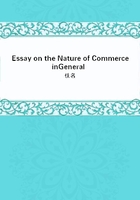
第16章
The Fancies, the Fashions, and the Modes of Living of the Prince, and especially of the Landowners, determine the use to which Land is put in a State and cause the variations in the Market price of all things If the owner of a large estate (which I wish to consider here as if there were no other in the world) has it cultivated himself he will follow his fancy in the use of which he will put it. (1) He will necessarily use part of it for corn to feed the labourers, mechanics and overseers who work for him, another part to feed the cattle, sheep and other animals necessary for their clothing and food or other commodities according to the way in which he wishes to maintain them. (2) He will turn part of the land into parks, gardens, fruit trees or vines as he feels inclined and into meadows for the horses he will use for his pleasure, etc.
Let us now suppose that to avoid so much care and trouble he makes a bargain with the overseers of the labourers, gives them farms or pieces of land and leaves to them the responsibility for maintaining in the usual manner all the labourers they supervise, so that the overseers, now become farmers or undertakers, give the labourers for working on the land or farm another third of the produce for their food, clothing and other requirements, such as they had when the owner employed them; suppose further that the owner makes a bargain with the overseers of the mechanics for the food and other things that he gave them, that he makes the overseers become master craftsmen, fixes a common measure, like silver, to settle the price at which the farmers will supply them with wood and they will supply him with cloth, and that the prices are such as to give the master craftsmen the same advantages and enjoyments as they had when overseers, and the journeymen mechanics will be settled by the day or by the piece: the merchandise which they have made, hats, stockings, shoes, clothes, etc. will be sold to the landowner, the farmers, the labourers, and the other mechanics reciprocally at a price which leaves to all of them the same advantages as before; and the farmers will sell, at a proportionate price, their produce and raw material.
It will then come to pass that the overseers become undertakers, will be the absolute masters of those who work under them, and will have more care and satisfaction in working on their own account. We suppose than that after this change all the people on this large estate live just as they did before, and so all the portions and farms of this great estate will be put to the same use as it formerly was.
For if some of the farmers sowed more corn than usual they must feed fewer sheep, and have less wool and mutton to sell.